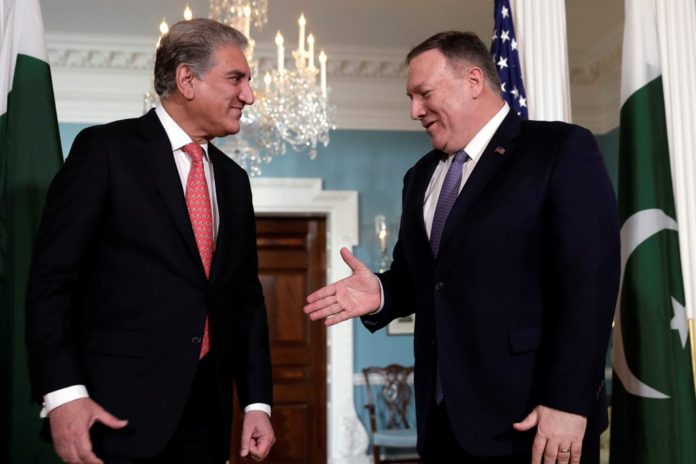KARACHI: The Afghanistan war signaled two things; the first, more obvious one, is that the United States no longer sees any benefit in its long-term involvement in Afghanistan; and the second is that it no longer needs, or at the very least wants, to rely on Pakistan.
Meanwhile, Pakistan had strongly expressed that it saw no reason for the United States to have NATO bases in the country and now as Washington no longer really needs them, it seems to be that not much is left between the two nations. Adding to this is the fact, that the US’ new regional favourite, India, is at odds with Pakistan since both the countries’ inception.
What’s more is that, Pakistan’s relationship with China is a continued sore spot for the United States as it remains very vary of the ‘sleeping giant.’ Washington continues to be displeased at Pakistan’s close diplomatic ties and trade agreements with China, which provide the Asian super-power direct access to the Indian ocean.
Furthermore, the latest push from the House calling for a probe into Pakistan’s alleged involvement in Afghanistan is worrying. While the bill is helmed by Republican senators who are arguably using the Afghan fall out to gain sympathy for right-wing voters, the situation does paint a dismal picture of the US-Pakistan relations.
This has left many understandably worried over the future of Pakistan and the United States’ relationship with us, and whether Pakistan should indeed shift its focus towards the East and away from Uncle Sam.
The Quad
The evidence certainly suggests that it may be a wise move. With increasing milatirsation of the Quadrilateral Security Dialogue – an alliance between Japan, India and Australia, led by the United States – it is not the worst thing that Pakistan chooses to look to China as an ally.
While the Quad was initially established for humanitarian purposes, it has since become a strategic alliance against a possible Chinese threat. The four regional powers involved have long decided to stand together as a strong maritime power, which is self-evident from the recent agreement between the United States, United Kingdom and Australia, which granted Sydney nuclear submarines and de facto protection by Washington.
The nuclear submarine deal is about “the ability to sink the Chinese navy in 72 hours” which will serves as, “a new level of deterrence,” according to former senior Defense Department official Matthew Kroenig.
Furthermore, the Washington under the Biden administration, which criticised Trump for his sympathies towards dictatorships, is seen doing the same by staying tight lipped about India’s democratic misgivings under Prime Minister Narendra Modi. This of course serves the strategic purpose of not alienating a Quad member, especially one that grants access to the Indian Ocean and the Asian subcontinent.
The move has not gone unnoticed. Prime Minister Imran Khan stated on the matter than he found the United States’ behaviour very regrettable. “It is unfortunate, very unfortunate, that the world’s approach to violations of human rights lacks even-handedness, and even is selective,” he lamented, while adding that, “geopolitical considerations, or corporate interests, commercial interests often compel major powers to overlook the transgressions of their affiliated countries.”
Pak and China Friendship
On the other hand, Pakistan continues to enjoy the favour of China and views it as its strongest ally. China and Pakistan have been involved in bilateral agreements for over 70 years, however, only recently with the Belt and Road Initiative (BRI) the relationship has become the strongest it has ever been.
This is partly because China is also responding to the American grouping with a coalition of its own by cultivating its ties with Russia, Iran and of course Pakistan. As such, Beijing has become a strategically crucial economic and political ally for Islamabad, with the two even referring to each other as ‘Iron Brothers’ whose relationship is unbreakable and an “all-weather friendship.”
The China-Pakistan Economic Corridor is a central project of the BRI and is continually growing larger with newer energy and development projects being added, the value for which would be nearly $62 billion when completed.
Additionally, China and Pakistan enjoy a strong military relationship with one another, where China looks to lean on Islamabad to navigate the newly complex security situation following the US withdrawal from Afghanistan.
PM Khan has also lauded China on many occasions, calling the Communist party’s achievements remarkable and praising Chinese President Xi Jinping for launching the BRI. “The [Chinese Communist Party] is a unique model. Up until now we were told that the best way for societies to improve themselves is the Western system of democracy,” he said, and added that, “they have actually beaten all Western democracies in the way they have brought up merit in their society.”
A Possible Middle Ground
Not all hope is lost just yet though. Pakistan, if it chooses to, could navigate the situation with swift democracy if it uses the little wiggle room it has to not pick sides in the US-China rivalry.
As China needs Pakistan for its economic corridor, that allyship is all but guaranteed. To mend relations with the US however, Pakistan needs to play to its strengths. Washington still requires Islamabad’s support navigating post-withdrawal Afghanistan. Pakistan, if it plays its cards right, would be crucial regarding the US engagement with the Taliban, refugee crises, counter-terrorism and intelligence sharing, and as has been recently evident, in the evacuation of priority personnel from Afghanistan. The only thing that stands in the way is the regime’s willingness to work with Washington.
